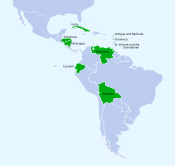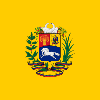| Revision as of 09:27, 29 September 2009 editRedthoreau (talk | contribs)Extended confirmed users, Pending changes reviewers23,540 editsm →External links: clean up← Previous edit | Revision as of 15:35, 30 September 2009 edit undoLapsed Pacifist (talk | contribs)18,229 editsNo edit summaryNext edit → | ||
| Line 109: | Line 109: | ||
| }} | }} | ||
| The '''Bolivarian Alliance for the Peoples of Our America''' ("Alternative" was replaced with "Alliance" on June 24, 2009) <ref>{{cite news | first= | last= | coauthors= | title=ALBA pasa a ser Alianza Bolivariana de los Pueblos de América | date=June 3, 2009 | publisher=Venezolana de Televisión | url =http://www.vtv.gob.ve/noticias-nacionales/19957 | work = | pages = | accessdate = 2009-06-30 | language = es}}</ref> ({{lang-es|Alianza Bolivariana para los Pueblos de Nuestra América}} or ALBA - which also means 'dawn' in Spanish) is an international cooperation organization based upon the idea of social, political, and economic integration between the countries of ] and the ]. It is associated with |
The '''Bolivarian Alliance for the Peoples of Our America''' ("Alternative" was replaced with "Alliance" on June 24, 2009) <ref>{{cite news | first= | last= | coauthors= | title=ALBA pasa a ser Alianza Bolivariana de los Pueblos de América | date=June 3, 2009 | publisher=Venezolana de Televisión | url =http://www.vtv.gob.ve/noticias-nacionales/19957 | work = | pages = | accessdate = 2009-06-30 | language = es}}</ref> ({{lang-es|Alianza Bolivariana para los Pueblos de Nuestra América}} or ALBA - which also means 'dawn' in Spanish) is an international cooperation organization based upon the idea of social, political, and economic integration between the countries of ] and the ]. It is associated with ] governments, and unlike ]s, the ALBA represents an attempt at regional economic integration that is not based primarily on ] but on a vision of social welfare, ] and mutual economic aid. ALBA nations are in the process of introducing a new regional currency, the ]. | ||
| ==Background== | ==Background== | ||
Revision as of 15:35, 30 September 2009
| This article has multiple issues. Please help improve it or discuss these issues on the talk page. (Learn how and when to remove these messages)
No issues specified. Please specify issues, or remove this template. (Learn how and when to remove this message) |
| Bolivarian Alliance for the Peoples of Our AmericaAlianza Bolivariana para los Pueblos de Nuestra América Template:Es icon | |
|---|---|
 Coat of arms
Coat of arms
| |
 | |
| Largest city | |
| Official languages | 2 |
| Member states | 9 Members |
| Establishment | |
| • Cuba-Venezuela Agreement | 14 December 2004 |
| • People's Trade Agreement | 29 April 2006 |
| Area | |
| • Total | 2,625,829 km (1,013,838 sq mi) |
| Population | |
| • 2008 estimate | 73,453,238 |
| • Density | 27.97/km (72.4/sq mi) |
| GDP (PPP) | 2008 estimate |
| • Total | $669.206 billion (21) |
| • Per capita | $9,110.64 (82) |
| Currency | 7 |
| Time zone | UTC-4 to -6 |
| Internet TLD | 9 |
| Website AlternativaBolivariana.org | |
The Bolivarian Alliance for the Peoples of Our America ("Alternative" was replaced with "Alliance" on June 24, 2009) (Template:Lang-es or ALBA - which also means 'dawn' in Spanish) is an international cooperation organization based upon the idea of social, political, and economic integration between the countries of Latin America and the Caribbean. It is associated with left-wing governments, and unlike free trade agreements, the ALBA represents an attempt at regional economic integration that is not based primarily on trade liberalization but on a vision of social welfare, bartering and mutual economic aid. ALBA nations are in the process of introducing a new regional currency, the SUCRE.
Background
The agreement was initially proposed by the government of Venezuela, led by Hugo Chavez, as an alternative to the failed Free Trade Area of the Americas (FTAA or ALCA in Spanish) proposed by the United States. The adjective Bolivarian refers to Simón Bolívar, who is revered as a hero in Venezuela and to a lesser extent in entire Spanish-speaking South America for his leadership of independence movements against Spanish colonial power.
When it was launched, ALBA had two member states, Venezuela and Cuba. Subsequently a number of other Latin American and Caribbean nations have entered into this Peoples' Trade Agreement (Spanish: Tratado de Comercio de los Pueblos, or TCP) which aims to implement the principles of ALBA.
The Cuba-Venezuela Agreement , which was signed on December 14, 2004, by Presidents Hugo Chávez and Fidel Castro, was aimed at the exchange of medical resources and petroleum between both nations. Venezuela delivers about 96,000 barrels of oil per day from its state-owned petroleum operations to Cuba at very favorable prices and Cuba in exchange sent 20,000 state-employed medical staff and thousands of teachers to Venezuela's poorest states.
Membership developments
President Evo Morales of poor but gas-rich Bolivia joined the TCP on April 29, 2006, only days before he announced his intention to nationalize Bolivia's hydrocarbon assets.
Newly elected President Daniel Ortega of Nicaragua signed the agreement in January 2007; Venezuela agreed to forgive Nicaragua's US$31 million debt as a result. On February 23, 2007, Ortega visited Caracas to solidify Nicaragua's participation in ALBA.. However, Nicaragua is also a member of the Central America Free Trade Agreement (CAFTA).
Rafael Correa, the president of Ecuador, signed a joint agreement with Hugo Chávez, to become a member of ALBA once he became president. Ecuador officially joined in June 2009.
In January 2008, the Caribbean island nation of Dominica joined ALBA.
On August 25 2008, Honduran President Manuel Zelaya signed an agreement to join the ALBA, with a rally in front of the Presidential House that was attended by many of the presidents of the countries that are part of ALBA, including Chávez and Morales. Congress approved ALBA on October 9, 2008.
In April 2009 Saint Vincent and the Grenadines was accepted as the seventh member of ALBA, while Grenada stated publicly that it was not yet ready to join the bloc.
In June 2009, the Prime Minister of Jamaica said he would seek address the future of the Caribbean Community (CARICOM) given the effects of ALBA and Trinidad and Tobago's proposed political union with the OECS on the Caribbean Community as the two main elements he says will have a "destabilising effect" on the Caribbean Community (CARICOM) bloc.
Antigua and Barbuda, Ecuador and Saint Vincent and the Grenadines formally joined ALBA on 24 June 2009.
Other developments
In December 2008, ALBA member countries met again to approve the technical details of the introduction of the new currency that was named SUCRE.
Member states
| Common name |
Official name |
Date joined |
Population |
Area (km²) |
GDP PPP (US$ bn) |
Capital |
|---|---|---|---|---|---|---|
| Antigua and Barbuda | Antigua and Barbuda | 24 June 2009 | 85,632 | 442 | 1.546 | St. John's |
| Bolivia | Plurinational State of Bolivia | 29 April 2006 | 9,119,152 | 1,098,581 | 43.424 | Sucre |
| Cuba | Republic of Cuba | 14 December 2004 | 11,451,652 | 110,861 | 108.2 | Havana |
| Dominica | Commonwealth of Dominica | 20 January 2008 | 72,660 | 754 | .72 | Roseau |
| Ecuador | Republic of Ecuador | 24 June 2009 | 14,573,101 | 256,370 | 106.993 | Quito |
| Honduras | Republic of Honduras | 9 October 2008 | 7,483,763 | 112,492 | 32.725 | Tegucigalpa |
| Nicaragua | Republic of Nicaragua | 23 February 2007 | 5,891,199 | 129,495 | 15.89 | Managua |
| Saint Vincent and the Grenadines | Saint Vincent and the Grenadines | 24 June 2009 | 120,000 | 389 | 1.085 | Kingstown |
| Venezuela | Bolivarian Republic of Venezuela | 14 December 2004 | 28,199,825 | 916,445 | 358.623 | Caracas |
| ALBA Totals | 9 Countries | – | 73,453,238 | 2,625,829 | 669.206 |
See also
Column-generating template families
The templates listed here are not interchangeable. For example, using {{col-float}} with {{col-end}} instead of {{col-float-end}} would leave a <div>...</div> open, potentially harming any subsequent formatting.
| Type | Family | Handles wiki table code? |
Responsive/ mobile suited |
Start template | Column divider | End template |
|---|---|---|---|---|---|---|
| Float | "col-float" | Yes | Yes | {{col-float}} | {{col-float-break}} | {{col-float-end}} |
| "columns-start" | Yes | Yes | {{columns-start}} | {{column}} | {{columns-end}} | |
| Columns | "div col" | Yes | Yes | {{div col}} | – | {{div col end}} |
| "columns-list" | No | Yes | {{columns-list}} (wraps div col) | – | – | |
| Flexbox | "flex columns" | No | Yes | {{flex columns}} | – | – |
| Table | "col" | Yes | No | {{col-begin}}, {{col-begin-fixed}} or {{col-begin-small}} |
{{col-break}} or {{col-2}} .. {{col-5}} |
{{col-end}} |
Can template handle the basic wiki markup {| | || |- |} used to create tables? If not, special templates that produce these elements (such as {{(!}}, {{!}}, {{!!}}, {{!-}}, {{!)}})—or HTML tags (<table>...</table>, <tr>...</tr>, etc.)—need to be used instead.
References
- "ALBA pasa a ser Alianza Bolivariana de los Pueblos de América" (in Spanish). Venezolana de Televisión. June 3, 2009. Retrieved 2009-06-30.
{{cite news}}: Cite has empty unknown parameter:|coauthors=(help) - Monthly Review, 2 July 2008, ALBA: Creating a Regional Alternative to Neo-liberalism?
- http://www.mltoday.com/Pages/NLiberation/Cuba-VenezPact.html/ initial Cuba-Venezuela TCP
- BBC NEWS | Americas | Leftist trio seals Americas pact
- venezuelanalysis.com | Venezuela News, Views, and Analysis
- Prensa Latina
- Venezuelan and Ecuadorian Presidents Seal Friendship with Joint Declaration | venezuelanalysis.com
- "Ecuador to Officially Join the ALBA Agreement". Ministry of Foreign Affairs of Cuba. June 3, 2009. Retrieved 2009-06-21.
{{cite news}}: Cite has empty unknown parameter:|coauthors=(help) - Fuller, Mike. "Dominica Joins ALBA Revolution". Retrieved 2008-01-28.
{{cite news}}: Cite has empty unknown parameter:|coauthors=(help) - http://www.plenglish.com/article.asp?ID={572E71EE-08F1-4328-A8C2-83D8840AC033}&language=EN
- Bajo presiones, Congreso ratifica adhesión a la Alba
- CARIBBEAN-ALBA-St.Vincent ready to join ALBA but Grenada is not, 21 April 2009
- "UNDESIRED CONSEQUENCES: Golding says CARICOM under threat". Caribbean News Agency. 2009-06-10. Retrieved 2009-06-23.
{{cite news}}: Cite has empty unknown parameter:|coauthors=(help); Unknown parameter|month=ignored (help)CS1 maint: date and year (link) - http://english.people.com.cn/90001/90777/90852/6683436.html
External links
- AlternativaBolivariana.org Template:Es icon
- Venezuela's Answer to "Free Trade": The Bolivarian Alternative for the Americas
- Cuba, Bolivia, Venezuela celebrate alternative to US-led trade pacts
- Venezuela and the Caribbean (April 21, 2006)
- Editorial: Hugo Chávez and the Americans (May 12, 2005)
- Text of December 14, 2004 agreement between Venezuela and Cuba for the application of ALBA
- Venezuelan and Ecuadorian Presidents Seal Friendship with Joint Declaration (Dec 22, 2006)
- Venezuela, leftist allies create regional currency (April 16, 2009)
- Learning from ALBA and the Bank of the South by Martin Hart-Landsberg, Monthly Review

